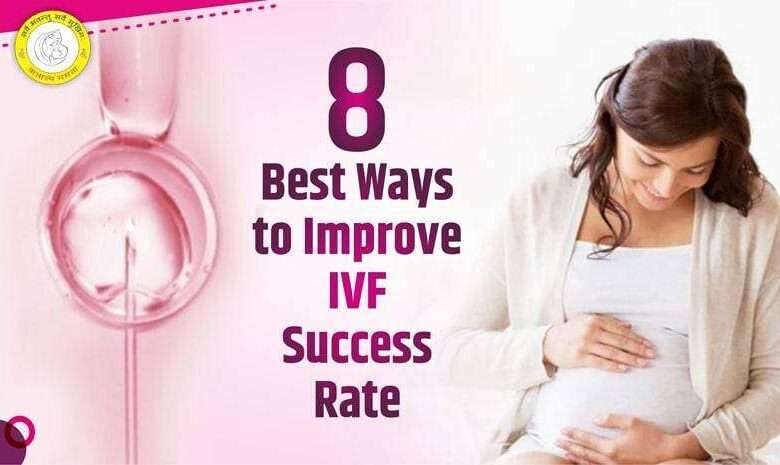8 Best Ways to Improve IVF Success Rate

Egg retrieval is a crucial moment in your IVF cycle. How your eggs perform can impact how you get and stay pregnant. What can you do to ensure your egg retrieval is a success? Our experience, patients, and the best medical research have led us to these tips that will help you improve the outcome of egg retrieval for IVF Success Rate.
What is IVF?
In this Article
In vitro Fertilization is a form of Assisted Reproductive Technology (ART). This involves removing eggs from a woman’s ovaries and fertilizing those using sperm. The fertilized egg is called an embryo. The embryo can be stored in a freezer or transferred to a woman’s uterus.
Factors Affecting IVF Success Rates
In Vitro Fertilization is a complex process that involves many moving parts and is highly dependent on timing. Many factors can affect your chances of IVF Success Rate.
1. Previous Pregnancy History
You will likely have a successful IVF pregnancy if you and your partner have had a happy pregnancy. IVF Success Rate can be more challenging if you have multiple miscarriages and other fertility problems with your new partner. It would help if you did not ignore it.
2. Egg and Embryo Quality
Other factors that affect the quality of eggs or embryos include age, ovarian reserve, and stimulation protocol. Higher-quality embryos and eggs will increase the chances of successful IVF treatment.
3. Sperm Quality
Egg quality is responsible for approximately 90% of all chromosomal issues in embryos. But there are still male fertility factors that can affect embryos. New technology can help to reduce fertility problems in male partners and make successful pregnancies more likely.
4. Embryo Transfer Technique
Many believe that embryo transfer is the most critical step in IVF treatment. A flawless transfer is crucial for the health of embryos and the success of the implant in the uterus. Any delay in timing or biological factors could be fatal to the process.
8 Best Ways to Improve Your IVF Success Rate
Here are some ways to increase your chances of having a high IVF success rate:
1. Limit Caffeine Intake
Research shows that 5 to 6 cups of coffee daily can decrease the chances of successful IVF. Experts recommend limiting caffeine-containing beverages like coffee and tea to 1 to 2 cups per day during IVF cycles and pregnancy.
2. Manage Stress with Meditation
Stress can negatively affect the reproductive system, which in turn reduces the chance of success with IVF. While it’s natural to worry about the outcome of fertility treatment, you should also relax daily. Meditation with gentle breathing techniques is a great way to reduce stress and help your body function at its best.
3. Prioritize Work-Life Balance
Assessing your work-life balance and stress levels is crucial for effectively managing your life. In today’s world with constant access to emails, messages, and phone calls, work and home life overlap. However, few jobs require constant supervision, even during evenings and weekends. To maintain a healthy work-life balance, learn to physically and mentally “close the door” to your office.
After you’re done working, switch off your email notifications or even turn off your phone completely. Once you get into this routine, you will realize that everything is done the next day.
4. Avoid Interference Before Sperm Collection
It is a strong recommendation that the IVF process is complete without sexual intercourse or ejaculation for 3-4 days. Although there is no scientific evidence to prohibit having sex after embryo transfers, it is a recommendation that you avoid any sexual activity that increases the cervix (e.g., deep penetration).
5. Maintain a Healthy BMI
Go to the gym to increase your chances of pregnancy. A low BMI can lower IVF success rates, according to a study by the Fertility Centre of Illinois. Improving your BMI to a healthy range, especially for women under 36, can significantly improve conception. Being overweight or 10 pounds lighter than usual likely won’t impact IVF success rates, but extreme deviations can. Aim for a BMI between 18.5 to 24.9.
6. Keep a healthy weight
Your chances of IVF Success Rate will be affected by your Body Mass Index (BMI). Obesity (BMI>35) and underweight (BMI<19) can both increase the difficulty in conception by up to 4 times. The procedure can be complicated if you are overweight. You can become a mother faster if you are overweight or obese.
7. Avoid Harmful Substances
Quit smoking, limit alcohol, and avoid processed foods to reduce inflammation and support hormone health.
It’s important to remember the mantra: “Softly does it.” This gentle-softly approach could pay off on egg retrieval day. This will help you save money on costly fertility injections. Patients in their 40s and 50s are particularly well-suit for mild IVF cycles.
8. Follow Post-Transfer Guidelines
Post-embryo transfer, avoid strenuous activity, hot baths, and deep penetration during intercourse to protect implantation.
Read the next article: How to Deal with High-Risk Pregnancy?
Prepare for a Successful IVF Journey
It can be stressful for you and your loved ones. There are many ways to increase your chances of IVF Success Rate. These include a healthy diet, proper sleep, supplements, and awareness of chemicals in household items.
We are committed to your success at IVF Centre in Patna. We can help families, couples, and singles who want to grow their families. Let’s make your baby’s dreams a reality. Talk to one of our specialists today.
FAQs
Foods to avoid after embryo transfer
Skip raw/undercooked meats, unpasteurized dairy, and high-mercury fish. Limit caffeine (<200 mg/day) and avoid alcohol.
What’s the best diet during IVF?
Whole grains, leafy greens, and berries (rich in antioxidants).
Lean proteins (e.g., eggs, fish) and healthy fats (e.g., avocados, nuts).
How can I maximize first-time IVF success?
Maintain a healthy weight, follow your clinic’s protocol, and manage stress. Consider pre-IVF testing (e.g., genetic screening).
How does age impact IVF success?
Women under 35: ~40–50% success per cycle.
Ages 35–37: ~33–40%.
Ages 38–40: ~20–30%.
Over 40: <15%, though donor eggs improve odds.
Are IVF success calculators accurate?
They provide estimates based on age, diagnosis, and prior cycles. Consult your doctor for personalized insights.



